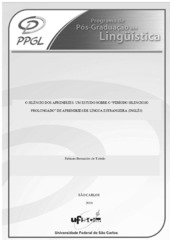| dc.contributor.author | Toledo, Fabiano Bernardes de | |
| dc.date.accessioned | 2016-06-02T20:25:11Z | |
| dc.date.available | 2011-11-01 | |
| dc.date.available | 2016-06-02T20:25:11Z | |
| dc.date.issued | 2010-10-19 | |
| dc.identifier.citation | TOLEDO, Fabiano Bernardes de. O silêncio dos aprendizes: um estudo sobre o período silencioso prolongado de aprendizes de língua estrangeira (inglês). 2010. 257 f. Dissertação (Mestrado em Ciências Humanas) - Universidade Federal de São Carlos, São Carlos, 2010. | por |
| dc.identifier.uri | https://repositorio.ufscar.br/handle/ufscar/5725 | |
| dc.description.abstract | The aim of this work was to investigate factors that could be related to the silence (in the classroom) of students of English as a foreign language at advanced levels of study, a phenomenon that we will call prolonged silence period, based on Krashen‟s silent period concept. According to this concept, it is natural that students at the beginning of the learning process of a new language go through a period in which they remain silent, just receiving linguistic input, until they have acquired some knowledge and the necessary confidence to start talking. Some students, however, tend to remain silent in class, even at higher levels of language study. In this investigation, we focus on how these students act in class. This work is based on studies about affective factors involved in the language teaching and learning process carried out by Brown (2000), Almeida Filho (1993) and Krashen & Terrell (1998), on studies about students beliefs regarding this process, carried out by Vieira-Abrahão and Barcelos (2006), Barcelos (2001) and Almeida Filho (1993), among others. The methodology of the research involves interviews, field notes, questionnaires, student´s retrospective selfevaluation, and audio and video recordings with students from two intermediateadvanced level groups and three advanced level groups of a private language institute. The goal is to identify and discuss possible factors that contribute to the lack of oral participation of these students in class, as well as their beliefs regarding the foreign language teaching and learning process, especially as it is related to oral practice. Through this work we verified, for example, the existence of a belief according to which being at an advanced level of learning of the target language means not being allowed to make mistakes, due to the thought that at this level of studies the oral production must be free from errors. Consequently, to avoid making such errors, some students opt to remain silent in class. | eng |
| dc.format | application/pdf | por |
| dc.language | por | por |
| dc.publisher | Universidade Federal de São Carlos | por |
| dc.rights | Acesso Aberto | por |
| dc.subject | Linguística aplicada | por |
| dc.subject | Língua inglesa - ensino e aprendizagem | por |
| dc.subject | Diferenças individuais | por |
| dc.subject | Produção oral | por |
| dc.subject | Período silencioso | por |
| dc.subject | Níveis avançados de estudo | por |
| dc.subject | Language teaching and learning | eng |
| dc.subject | Individual differences | eng |
| dc.subject | Oral
production | eng |
| dc.subject | Silent period | eng |
| dc.subject | Advanced levels of study | eng |
| dc.title | O silêncio dos aprendizes: um estudo sobre o "período silencioso prolongado" de aprendizes de língua estrangeira (inglês) | por |
| dc.type | Dissertação | por |
| dc.contributor.advisor1 | Viana, Nelson | |
| dc.contributor.advisor1Lattes | http://lattes.cnpq.br/6252579012192711 | por |
| dc.description.resumo | O foco deste trabalho está voltado para a investigação de fatores que possam estar relacionados ao silêncio (em sala de aula) de alunos de língua inglesa de níveis intermediário-avançado e avançado, fenômeno que denominaremos período silencioso prolongado, a partir do conceito de silent period (período silencioso) de Krashen. De acordo com esse conceito, é natural que alunos no início do processo de aprendizagem de uma nova língua vivenciem um período no qual permaneçam em silêncio, apenas recebendo insumo lingüístico, até que tenham adquirido certo conhecimento e a confiança necessária para começarem a falar. Alguns alunos, no entanto, tendem a permanecer em silêncio durante as aulas, mesmo já em estágios mais avançados de estudos da língua. Focalizamos, em nossa análise, a atuação desses alunos. O trabalho baseia-se em estudos sobre fatores afetivos envolvidos no processo de ensino e aprendizagem de línguas realizados por Brown (2000), Almeida Filho (1993) e Krashen e Terrell (1998), em estudos sobre crenças de alunos a respeito desse processo, realizados por Vieira-Abrahão e Barcelos (2006), Barcelos (2001) e Almeida Filho (1993), entre outros. A metodologia da pesquisa envolve entrevistas, notas de campo, questionários, auto-avaliação retrospectiva de aprendizes e gravações em áudio e vídeo com alunos de duas turmas de nível intermediário-avançado e três turmas de nível avançado em um instituto privado de idiomas. O objetivo é identificar e discutir possíveis motivos que levam alguns desses alunos a não interagir em sala de aula, assim como suas crenças a respeito do processo de ensino e aprendizagem de língua estrangeira, notadamente no que se refere à prática da oralidade. Por meio deste estudo, constatamos, por exemplo, a existência de uma crença segundo a qual estar em nível avançado de aprendizagem da língua significa a impossibilidade de que erros sejam cometidos, em virtude da expectativa de que nesse nível de estudos a produção oral deve estar isenta de erros. Consequentemente, para evitar que tais erros ocorram, alguns aprendizes optam por ficar em silêncio em sala de aula. | por |
| dc.publisher.country | BR | por |
| dc.publisher.initials | UFSCar | por |
| dc.publisher.program | Programa de Pós-Graduação em Linguística - PPGL | por |
| dc.subject.cnpq | LINGUISTICA, LETRAS E ARTES::LINGUISTICA::LINGUISTICA APLICADA | por |
| dc.contributor.authorlattes | http://lattes.cnpq.br/2488246391118032 | por |
